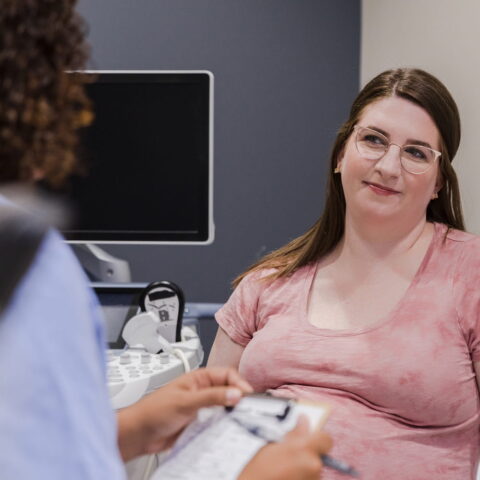Research
Research in this area deals with the transitions through a woman’s life, beginning with early childhood development through puberty, adult life and menopause. These transitions are especially important as women are more frequently delaying child birth until their later years. Each stage is critical to sustain women’s health and quality of life. The dynamic hormonal changes that accompany each life stage can significantly impact all aspects of women’s health, including bone, reproductive and cardiovascular health, metabolism and cancer. Faculty: Jonathan Butcher: medical device technology design, soft tissue biomechanics, cardiovascular diseaseBarbara Chubak, MD: sexual dysfunction, regenerative medicine, cosmetic genital surgery, bioethicsPaula Cohen: gamete development and chromosomal abnormalities, contraceptionArunika Das: reproductive aging, early pregnancy loss, embryo developmentKaterina Dodelzon: breast cancer screening, breast cancer surveillance for high risk populationsTamatha Fenster, MD: pelvic surgery, women's health technology innovationCori Green: pediatric mental health integrationAlison Hermann, MD: perinatal mood and anxiety disorders, menopause and mental health, reproductive psychiatry educationGunisha Kaur: global health, refugee health, forcibly displaced populationsAmy Kuceyeski: women's brain health, neuroimaging, AISiu Sylvia Lee: metabolic regulation, gene expression regulationMarla Lujan: folliculogenesis, menstrual cycle, polycystic ovary syndrome, adolescent reproductive transitionSabina Marciano: neurodegenerative diseases and menopause-linked brain changes, imaging brain network shiftsRoberta Marongiu: menopause, Alzheimer's disease, Parkinson's diseaseDavid S. Matteson: AI, data science, statisticsJane Mendle: mental health, puberty, adolescenceKelly Musick: social context of childbearing, gendered costs of parentingNozomi Nishimura: neurodegenerative disease, cardiovascular diseaseKimberly O'Brien: nutrition, pregnancy, placental nutrient trafficking, bone health, anemia, osteoporosisLauren M. Osborne, MD: perinatal mood and anxiety disordersSallie Permar: congenital infections, maternal vaccination, maternal-infant immunologyNed Place: obstetrics and gynecology, endocrinology, ovarian development and agingLisa Placanica: intellectual property, commercial partnerships, new venture creationDiana Punko: post-partum psychosis, substance use disorders in pregnancyYi Athena Ren: ovarian biology, reproductive endocrinology, reproductive biotechnologySunita Sah: gender differences in medical care, decision-making, social and interpersonal factorsLaura Sahyoun: inflammatory bowel disease, intestinal ultrasoundChris B. Schaffer: neurodegenerative disease, animal models of menopause, in vivo optical imagingAyshwarya Subramanian: autoimmune disease, Alzheimer's disease, menopauseRulla Tamimi: cancer, cancer risk assessment, screeningCeren Tozlu: menopause, multiple sclerosis, hormones, agingMarjolein van der Meulen: musculoskeletal health, osteoporosis and osteoarthritisVictoria M. Wilkins: perinatal loss, mental health in midlife/menopause transition, traumaKayla Wolf: reproductive tissue engineering and mechanobiology Centers and Institutes: Menopause Health Engineering
Women’s reproductive health is impacted by a range of disorders, including hormonal conditions like polycystic ovary syndrome (PCOS), endometriosis, and primary ovarian insufficiency, which affect fertility and menstrual cycles. Structural issues such as uterine fibroids, Müllerian anomalies, and pelvic organ prolapse can lead to pain, pregnancy complications, or infertility. Menstrual disorders like dysmenorrhea, menorrhagia, and amenorrhea disrupt normal cycles, while infectious diseases such as pelvic inflammatory disease (PID) and sexually transmitted infections (STIs) can cause long-term reproductive damage. Autoimmune and genetic disorders, including Turner syndrome, congenital adrenal hyperplasia, and lupus, may affect puberty, ovarian function, or pregnancy outcomes. Pregnancy-related conditions like preeclampsia, gestational diabetes, and recurrent pregnancy loss pose risks for both mother and baby. Cancers of the reproductive system (cervical, ovarian, and endometrial) and sexual dysfunction disorders (vaginismus, dyspareunia) further impact reproductive well-being. Additionally, pubertal defects like delayed puberty or precocious puberty result from hormonal imbalances or genetic conditions, affecting development and future fertility. Faculty: Jonathan Butcher: medical device technology design, soft tissue biomechanics, cardiovascular diseaseBarbara Chubak, MD: sexual dysfunction, regenerative medicine, cosmetic genital surgery, bioethicsBen Cosgrove: female reproductive lifespan, ovarian and endometrial cancers, musculoskeletal dysfunctionArunika Das: reproductive aging, early pregnancy loss, embryo developmentCallum Donnelly: metabolic syndrome effect on fertility and pregnancyTamatha Fenster, MD: pelvic surgery, women's health technology innovationMelissa Frey: genetic predisposition to gynecologic cancer; health implications of premature menopauseAileen Gariepy, MD: unintended pregnancy, abortion care, miscarriage care, reproductive justiceJeannine Gerhardt: diminished ovarian reserve, human granulosa cells and oocyte researchAlexander Gleed: fetal ultrasound, placenta, ultrasonic tissue characterization, image analysisSharmila Ghosh: early pregnancy lossIman Hajirasouliha: AI, in vitro fertilization (IVF), polycystic ovary syndrome (PCOS)Gunisha Kaur: global health, refugee health, forcibly displaced populationsAlex Kwan: postpartum depression, mental health, antidepressant, drug developmentSiu Sylvia Lee: metabolic regulation, gene expression regulationMarla Lujan: folliculogenesis, menstrual cycle, polycystic ovary syndrome, adolescent reproductive transitionDavid S. Matteson: AI, data science, statisticsAnna Sophia McKenney: image-guided interventionsAlexander Nikitin: ovarian and endometrial cancersNupoor Narula, MD: pregnancy-related aortic complicationsKimberly O'Brien: nutrition, pregnancy, placental nutrient trafficking, bone health, anemia, osteoporosisLauren M. Osborne, MD: perinatal mood and anxiety disordersSallie Permar: congenital infections, maternal vaccination, maternal-infant immunologyLisa Placanica: intellectual property, commercial partnerships, new venture creationMichael Podolsky: cell biology of decidual tissues and parturition; molecular regulation of uterine remodelingYi Athena Ren: ovarian biology, reproductive endocrinology, reproductive biotechnologyLaura Sahyoun: inflammatory bowel disease, intestinal ultrasoundRicha Sardana: cancers of the reproductive system, Alzheimer’s disease, protein homeostasis mechanismsJohn Schimenti: reproductive genetics; placentation; reproductive agingPraveen Sethupathy: vulvar squamous cell carcinoma, lupus and microRNAsAlpana Shukla: gestational diabetes mellitus (GDM), postmenopausal cardiovascular disease risk reductionVertika Singh: reproductive biology, primary ovarian insufficiency (POI), endometrial cancerHeidi Stuhlmann: placental development and disease, fetal programming, transposon dysregulationRobert Weiss: meiotic mechanisms, genome maintenance pathways in gametogenesis, germ cell tumorsKayla Wolf: reproductive tissue engineering and mechanobiologyTamar Zelovich: endometriosis, digital health, symptoms monitoring
Beyond the reproductive system, women’s susceptibility to certain diseases is influenced by hormonal, genetic, anatomical, and social factors. Additionally, the historical bias in medical research has led to gaps in understanding and effectively treating diseases in women. Addressing these disparities requires better inclusion in clinical trials, sex-specific treatment approaches, and increased awareness. Autoimmune diseases, such as lupus and multiple sclerosis, are far more common in women, likely due to estrogen’s impact on immune function and genetic influences from the X chromosome. Cardiovascular disease, the leading cause of death in women, often presents with atypical symptoms, leading to underdiagnosis, while osteoporosis is more prevalent due to estrogen deficiency after menopause and lower peak bone mass. Women account for two-thirds of Alzheimer’s disease cases, with hormonal changes and genetic factors playing key roles. Depression and anxiety are twice as common in women due to hormonal fluctuations and differences in brain chemistry, while chronic pain conditions like fibromyalgia and migraines are linked to heightened pain sensitivity and immune responses. Women are also more prone to urinary tract infections due to anatomical differences and face a higher risk of chronic kidney disease progression. Faculty: Hector Aguilar-Carreno: long COVID and other infectious diseases that affect women more than menIlana Brito: links between the microbiome and autoimmune diseaseJonathan Butcher: medical device technology design, soft tissue biomechanics, cardiovascular diseaseBarbara Chubak, MD: sexual dysfunction, regenerative medicine, cosmetic genital surgery, bioethicsCharles Danko: genomics, gene regulation Katerina Dodelzon: breast cancer screening, breast cancer surveillance for high risk populationsOrli Etingin: preventive care, menopause, thrombotic disorders in pregnancyClaudia Fischbach-Teschl: breast cancer, menopause-related skeletal changes, effect of obesity on cancer development and progressionSilvia C. Formenti: women and cancer; radiation biology, oncology and immunology Mario Gaudino, MD: cardiac surgery, clinical trials Michael Glass: brain plasticity during hypertension in rodent menopause models Alexander Gleed: fetal ultrasound, placenta, ultrasonic tissue characterization, image analysisAlison Hermann, MD: perinatal mood and anxiety disorders, menopause and mental health, reproductive psychiatry educationGunisha Kaur: global health, refugee health, forcibly displaced populationsJiwon Kim: cardiovascular disease, cardiovascular imaging Amy Kuceyeski: women's brain health, neuroimaging, AITatyana Kushner: liver disease and pregnancy, hormone replacement and liver diseaseSiu Sylvia Lee: metabolic regulation, gene expression regulationYi Liu: osteoporosis, menopauseSabina Marciano: neurodegenerative diseases and menopause-linked brain changes, imaging brain network shiftsRoberta Marongiu: menopause, Alzheimer's disease, Parkinson's diseaseDavid S. Matteson: AI, data science, statisticsJyoti S. Mathad: maternal infectious diseases (including HIV), gestational diabetes Molly McNairy, MD: women's cardiovascular disease, adolescent HIV and reproductive healthDiksha Mishra: gender-based violence, emergency medicine, pain, professional development and policiesCarolyn Newberry: nutrition, obesityNozomi Nishimura: neurodegenerative disease, cardiovascular diseaseKimberly O'Brien: nutrition, pregnancy, placental nutrient trafficking, bone health, anemia, osteoporosisLauren M. Osborne, MD: perinatal mood and anxiety disordersJessica Peña: prevention of cardiovascular disease, implementation science Ned Place: obstetrics and gynecology, endocrinology, ovarian development and agingLisa Placanica: intellectual property, commercial partnerships, new venture creationKristen Pleil: female-specific mechanisms underlying mental illnesses and alcohol/substance use disorders Yi Athena Ren: ovarian biology, reproductive endocrinology, reproductive biotechnologyLaura E. Riley, MD: infectious disease effects on pregnancy, vaccines and pregnancy Monika M. Safford, MD: cardiovascular disease in women; peer coaching to improve health behaviorsSunita Sah: gender differences in medical care, decision-making, social and interpersonal factorsRicha Sardana: cancers of the reproductive system, Alzheimer’s disease, protein homeostasis mechanismsJohn Schimenti: reproductive genetics; placentation; reproductive agingAlpana Shukla: gestational diabetes mellitus (GDM), postmenopausal cardiovascular disease risk reductionMadeline Sterling: cardiovascular disease, caregiving, workforce and long-term care Ayshwarya Subramanian: autoimmune disease, Alzheimer's disease, menopauseCeren Tozlu: menopause, multiple sclerosis, hormones, agingMarjolein van der Meulen: musculoskeletal health, osteoporosis and osteoarthritisJingjie Yeo: mucus-related disorders, muco-adhesive and muco-penetrative therapies
Environmental factors significantly impact women's health, with climate change, pollution and resource depletion contributing to a range of issues. Exposure to air and water pollution can increase the risk of respiratory and cardiovascular diseases, which disproportionately affect women due to biological factors, such as hormonal differences that influence immune response, as well as cultural and social factors, such as women's higher exposure to household air pollution from cooking. Infectious diseases, often exacerbated by poor sanitation and changing climate patterns, can lead to higher rates of illness among women. These risks are significantly exacerbated in in low-income regions where women have limited access to healthcare. Environmental changes also influence food security and nutrition. Women, especially in developing countries, bear the brunt of food scarcity and malnutrition, which can lead to complications such as anemia, poor maternal health and stunted child growth, affecting their reproductive health and overall well-being. These environmental impacts are compounded by gender inequalities, such as women's limited access to resources and decision-making power, amplifying their vulnerability to these health risks. At Cornell, we also think about public policy and nutrition as environmental influences on women’s health. An appropriate diet, coupled with routine exercise, are not only critical for all aspects of women’s health, but are particularly crucial throughout the reproductive system. All of the above factors are areas of research at Cornell, where we aim to use our knowledge to influence policy makers worldwide. Faculty: Kemi Babagbemi, MD: breast cancer disparities, risk assessment and personalized screening; global breast cancer screeningLaura Bellows: public health interventions, nutrition, physical activity, self-care, obesityBarbara Chubak, MD: sexual dysfunction, regenerative medicine, cosmetic genital surgery, bioethicsLigia Fonseca Coelho: space science, menstruation technology, medical devices for women in space and in the field Silvia C. Formenti: women and cancer; radiation biology, oncology and immunology Alexander Gleed: fetal ultrasound, placenta, ultrasonic tissue characterization, image analysisRia Goswami: infectious diseases during pregnancy, vertical transmission, infant immunity developmentSachin Gupta: access to eye health in India Alison Hermann, MD: perinatal mood and anxiety disorders, menopause and mental health, reproductive psychiatry educationGunisha Kaur: global health, refugee health, forcibly displaced populationsMatthew Kibbee: evidence synthesis, systematic reviews Siu Sylvia Lee: metabolic regulation, gene expression regulationLori Leonard: global health programming and policy; medical humanities Marla Lujan: folliculogenesis, menstrual cycle, polycystic ovary syndrome, adolescent reproductive transitionRoberta Marongiu: menopause, Alzheimer's disease, Parkinson's diseaseBeth McGinty: health policy, child welfare policyGeraldine McGinty: payment policy for breast cancer screening, sustainability in medical imagingMolly McNairy, MD: women's cardiovascular disease, adolescent HIV and reproductive healthJane Mendle: mental health, puberty, adolescenceDiksha Mishra: gender-based violence, emergency medicine, pain, professional development and policiesKelly Musick: social context of childbearing, gendered costs of parentingCarolyn Newberry: nutrition, obesityLauren M. Osborne, MD: perinatal mood and anxiety disordersLindsey Reif: HIV, cardiovascular disease, adolescent health Laura E. Riley, MD infectious disease effects on pregnancy, vaccines and pregnancy Monika M. Safford, MD: cardiovascular disease in women; peer coaching to improve health behaviorsSunita Sah: gender differences in medical care, decision-making, social and interpersonal factorsMadeline Sterling: cardiovascular disease, caregiving, workforce and long-term care Matthew Wilkens: AI, natural language processing, social media analysis Yiye Zhang: clinical decision support, risk prediction, built environment
Cornell researchers are investigating every aspect of mother-infant health from the establishment of a viable embryo to implantation and placental development. The growth and development of the fetus, along with the health of the mother, are all critically dependent on access to good nutrition, as well routine medical evaluations. Faculty: Arunika Das: reproductive aging, early pregnancy loss, embryo developmentCallum Donnelly: metabolic syndrome effect on fertility and pregnancyTamatha Fenster, MD: pelvic surgery, women's health technology innovationAlexander Gleed: fetal ultrasound, placenta, ultrasonic tissue characterization, image analysisRia Goswami: infectious diseases during pregnancy, vertical transmission, infant immunity developmentCori Green: pediatric mental health integrationAlison Hermann, MD: perinatal mood and anxiety disorders, menopause and mental health, reproductive psychiatry educationCindy Hsin-Liu Kao: wearable technology, on-skin interfaces, electronic textiles, therapeutic hapticsMatthew Kibbee: evidence synthesis, systematic reviewsTatyana Kushner: liver disease and pregnancy, hormone replacement and liver diseaseJyoti S. Mathad: maternal infectious diseases (including HIV), gestational diabetes David S. Matteson: AI, data science, statisticsKimberly O'Brien: nutrition, pregnancy, placental nutrient trafficking, bone health, anemia, osteoporosisLauren M. Osborne, MD: perinatal mood and anxiety disordersSallie Permar: congenital infections, maternal vaccination, maternal-infant immunologyLisa Placanica: intellectual property, commercial partnerships, new venture creationMichael Podolsky: cell biology of decidual tissues and parturition; molecular regulation of uterine remodelingLaura Sahyoun: inflammatory bowel disease, intestinal ultrasoundJohn Schimenti: reproductive genetics, placentation, reproductive agingAbby Snyder: infant feeding, contact tracing, Cronobacter infection Moeun Son: labor and childbirth, pregnancy Heidi Stuhlmann: placental development and disease, fetal programming, transposon dysregulation Centers and Institutes: PORTENT Center for Point of Care Technologies for Nutrition, Infection and Cancer for Global Health
Research aimed at enhancing reproductive choice spans a wide range of fields, from developing more effective and accessible contraceptive methods to advancing assisted fertility technologies. Innovations in contraception are focusing on creating nonhormonal options, long-acting reversible methods and male contraceptives, with an emphasis on improving efficacy, safety and accessibility. Female solutions for novel contraception are also an area of focus at Cornell, with researchers attempting to provide alternatives to hormonal-based methods that many women cannot tolerate. In the realm of assisted fertility, research is progressing in areas like improving in vitro fertilization (IVF) techniques, genetic screening and embryo preservation, as well as exploring stem cell therapies and gene editing to overcome infertility challenges. Cornell also has a strong focus on gamete quality, including understanding the unique cellular environment and challenges of male and female germ cells. Faculty: Paula Cohen: gamete development and chromosomal abnormalities, contraceptionOrli Etingin: preventive care, menopause, thrombotic disorders in pregnancyTamatha Fenster, MD: pelvic surgery, women's health technology innovationAileen Gariepy, MD: unintended pregnancy, abortion care, miscarriage care, reproductive justiceJeannine Gerhardt: diminished ovarian reserve, human granulosa cells and oocyte researchIman Hajirasouliha: AI, in vitro fertilization (IVF), polycystic ovary syndrome (PCOS)Alison Hermann, MD: perinatal mood and anxiety disorders, menopause and mental health, reproductive psychiatry educationLonny Levin: nonhormonal contraceptive development Lori Leonard: global health programming and policy, medical humanities Ned Place: obstetrics and gynecology, endocrinology, ovarian development and agingLisa Placanica: intellectual property, commercial partnerships, new venture creationLaura Sahyoun: inflammatory bowel disease, intestinal ultrasoundVertika Singh: reproductive biology, primary ovarian insufficiency (POI), endometrial cancer Centers and Institutes: Cornell Reproductive Science Center
Studying women's mental health is crucial because biological, hormonal and social factors uniquely influence women's mental well-being. Women experience higher rates of anxiety, depression and conditions like postpartum depression, which are often underdiagnosed or undertreated. Gender-based disparities, societal pressures and trauma also contribute to mental health challenges. Understanding these factors allows for better-targeted treatments, policies and support systems, ultimately improving quality of life and healthcare outcomes for women. Faculty: Barbara Chubak, MD: sexual dysfunction, regenerative medicine, cosmetic genital surgery, bioethicsAileen Gariepy, MD: unintended pregnancy, abortion care, miscarriage care, reproductive justiceAlison Hermann, MD: perinatal mood and anxiety disorders, menopause and mental health, reproductive psychiatry educationCindy Hsin-Liu Kao: wearable technology, on-skin interfaces, electronic textiles, therapeutic hapticsGunisha Kaur: global health, refugee health, forcibly displaced populationsAmy Kuceyeski: women's brain health, neuroimaging, AIAlex Kwan: postpartum depression, mental health, antidepressant, drug developmentSabina Marciano: neurodegenerative diseases and menopause-linked brain changes, imaging brain network shiftsRoberta Marongiu: menopause, Alzheimer's disease, Parkinson's diseaseBeth McGinty: health policy, child welfare policy Jane Mendle: mental health, puberty, adolescenceKelly Musick: social context of childbearing, gendered costs of parentingLauren M. Osborne, MD: perinatal mood and anxiety disordersLisa Placanica: intellectual property, commercial partnerships, new venture creationKristen Pleil: female-specific mechanisms underlying mental illnesses and alcohol/substance use disorders Diana Punko: post-partum psychosis, substance use disorders in pregnancyYi Athena Ren: ovarian biology, reproductive endocrinology, reproductive biotechnologySunita Sah: gender differences in medical care, decision-making, social and interpersonal factorsLaura Sahyoun: inflammatory bowel disease, intestinal ultrasoundMadeline Sterling: cardiovascular disease, caregiving, workforce and long-term careVictoria M. Wilkins: perinatal loss, mental health in midlife/menopause transition, traumaYiye Zhang: clinical decision support, risk prediction, built environment
Femtech (female technology) has experienced rapid growth over the past decade, driven by increased awareness and investment in women’s health. Initially focused on menstrual tracking apps and fertility solutions, the industry has expanded to include menopause care, maternal health, sexual wellness and chronic disease management. With billions in funding, femtech is breaking long-standing healthcare taboos, improving access to personalized care, and addressing gaps in medical research that have historically overlooked women's health. Its impact is seen in improved healthcare outcomes, greater patient autonomy, and a growing market expected to reach over $100 billion in the coming years. Faculty: Kemi Babagbemi, MD: breast cancer disparities, risk assessment and personalized screening; global breast cancer screeningKendra Batchelder: breast cancer, startup Jonathan Butcher: medical device technology design, soft tissue biomechanics, cardiovascular diseaseBarbara Chubak, MD: sexual dysfunction, regenerative medicine, cosmetic genital surgery, bioethicsPaula Cohen: gamete development and chromosomal abnormalities, contraceptionLigia Fonseca Coelho: space science, menstruation technology, medical devices for women in space and in the fieldTamatha Fenster, MD: pelvic surgery, women's health technology innovationClaudia Fischbach-Teschl: breast cancer, menopause-related skeletal changes, effect of obesity on cancer development and progressionAileen Gariepy, MD: unintended pregnancy, abortion care, miscarriage care, reproductive justiceAlexander Gleed: fetal ultrasound, placenta, ultrasonic tissue characterization, image analysisIman Hajirasouliha: AI, in vitro fertilization (IVF), polycystic ovary syndrome (PCOS)Alison Hermann, MD: perinatal mood and anxiety disorders, menopause and mental health, reproductive psychiatry educationDenise Howard: women's health department leader, gynecological surgery, Ob/gyn care, tech innovationCindy Hsin-Liu Kao: wearable technology, on-skin interfaces, electronic textiles, therapeutic hapticsGunisha Kaur: global health, refugee health, forcibly displaced populationsMatthew Kibbee: evidence synthesis, systematic reviews Yi Liu: osteoporosis, menopauseSabina Marciano: neurodegenerative diseases and menopause-linked brain changes, imaging brain network shiftsAnna Sophia McKenney: image-guided interventionsLisa Placanica: intellectual property, commercial partnerships, new venture creationAnaïs Rameau: voice, reproductive health and menopause; laryngeal disease; digital health Laura E. Riley, MD: infectious disease effects on pregnancy, vaccines and pregnancy Moeun Son: labor and childbirth, pregnancy Jennifer J. Sun: computer vision, AI for health Matthew Wilkens: AI, natural language processing, social media analysis Jingjie Yeo: mucus-related disorders, muco-adhesive and muco-penetrative therapiesTamar Zelovich: endometriosis, digital health, symptoms monitoringYiye Zhang: clinical decision support, risk prediction, built environment








